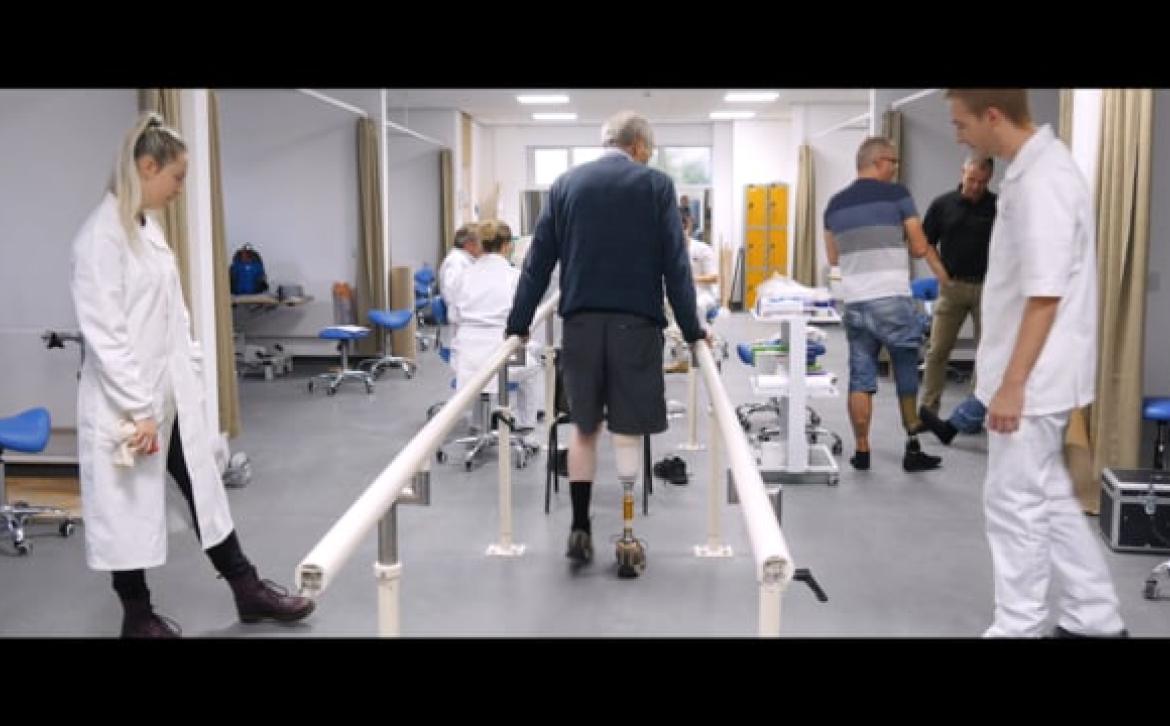Studying Prosthetics and Orthotics at Salford
So you’ve applied to study Prosthetics and Orthotics, we've made you an offer, but you’re still deciding or have further questions?
We want to make sure you have all the information you need as you get ready to study at Salford. We hope the information below helps you in your decision making. If you have any further questions, simply get in touch with us here.
Why should you study Prosthetics and Orthotics at the University of Salford?
You will spend time in clinical placements where you will get the chance to work with real patients and applying what you have learnt. 97% of our graduate students said the course has provided them with opportunities to apply what they had learnt.
This course focuses on working collaboratively with patients and other healthcare professionals. In the last National Student Survey, 90% of students agreed that they had the right opportunities to work with other students as part of the course.
You will benefit from our strong links with the NHS in Greater Manchester as well as a number of private specialist companies throughout the UK.
Our facilities
As this is a highly specialised profession, we aim to provide you with the latest tools and facilities that will enhance your professional and personal development. Students of prosthetics and orthotics are taught with hands-on clinical practice while dealing with patients in our custom-designed clinic rooms.
Further practice is undertaken in our workshops which boast a well-equipped machine room with CAD/CAM facilities and the plaster room where impressions of patients' anatomy can be modified for the subsequent manufacture of custom-made prostheses or orthoses.
Whilst on this course, you also have the opportunity to conduct motion analysis in one of three movement laboratories.

"It's not like a normal university course where you sit in large lecture theatres with loads of students - it's relaxed, classes are small, and your lecturers are friends. Each year gets more in-depth, but we basically spend a few days a week learning anatomy, pathologies and biomechanics that we apply to 'clinic and workshop' days where we go from casting a real patient to making a full leg across a few weeks. It is very hands-on right from day one. In the second and third year, we go on placements for each discipline and I've enjoyed that the most. got the opportunity to help a service user who had lost a lot of weight because their current leg socket was too big - by hand-casting a more modern design. I later heard that the user said it was the most comfortable leg they had ever worn. It was amazing to know how something I had done as a student had affected someone else's life for the better."
Student Support Services
We want you to enjoy your time studying here, but we understand that there may be times when you need a little extra support. Whether you need support with mental health and counselling, living costs, accommodation or just want a chat with our friendly Wellbeing Team, we will be here to help. Find out more about all of the student services we offer here.
What is the mix between lectures and practical work on the Prosthetics and Orthotics course?
Our practical and clinical work takes place during our General Prosthetics and Orthotics and Introduction to Prosthetics and Orthotics modules. We have other modules in materials and design, motion analysis and anatomy and physiology which supplement our clinical learning. We tend to work at least two days a week practically and then have lectures around these sessions.
How do the Prosthetics and Orthotics placements work?
There are two main placements that are completed in 16 week blocks. Students are based in one company or NHS trust per placement. You may be based in a different location for the two placements and it is possible to take the placements abroad.
What locations are placements typically in?
The locations of the placements can vary but tend to be within the reach of the greater Manchester area. We take your preferences into account wherever possible, along with many other factors such as where you live, what type of transport you use, your previous placement, work and life experience. Ultimately, everything depends on the type and location of available placements. You may have to stay away from home and meet the initial costs associated with this. You can however claim this cost back using the Learning Support Fund. Wherever possible we will try to keep your journey times to under 90-minutes, but again, this is subject to placement availability.
Do we need to buy everything on the reading list?
We would suggest that you make use of the online resources provided and make a judgement call on the books you need once you have started the course. People do re-sell books so you can often pick them up cheaper after starting at the university. The library also has a great range of resources and online books available for our students.

